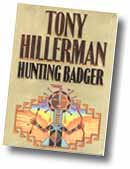Nov. 20, 1999 Book Review by Katharhynn Heidelberg
Releasing such a book as Hunting Badger in this area is a daring move. No matter what caveats are given, it is bound to produce comparisons between the tragedy that occurred here May 29, 1998, and master storyteller Tony Hillerman’s creative license. The accusations such a work prompts -- Hillerman’s explanatory forward and touching dedication to murdered hero Dale Claxton notwithstanding -- are that it is unwise to write about a case that has not been concluded and that it is downright unseemly to profit from murder and mayhem. Hillerman’s reasons for writing a book like this can only be guessed at, however, and tarring him with the brush of crass commercialism is unfair. Everyone in the publishing world is motivated by profit, but not everyone writes as well as he does, and few have his feel for the area, much less his talent for expressing it. Hunting Badger neither demonizes nor sanctifies Jason McVean, Alan Pilon or Robert Mason. In fact, Hillerman never mentions them outright, and the events of 1998 are not the center of the action. The plot centers instead around a second police-shooting, this time by perpetrators who make good their plans to rob the Ute Casino, and vanish into the desert. The book only vaguely alludes to the "Great Manhunt of 1998." Still, it is obvious where the inspiration for the work comes from: there is a casino robbery, a shooting in which one security officer is slain and another wounded, and the perpetrators are thought to be survivalists who are part of a "bigger picture." As events unfold, it is also concluded that one of the three has committed suicide, but discussing that further would give away a rather good ending. What Hillerman has done with the "real" story is indisputably creative, even if the "mystique" gets pretty thin at times. Hunting Badger features his famous protagonists Joe Leaphorn and Jim Chee, and it makes de facto many of the theories that swirled up in the wake of our very real tragedy -- with a few twists, but again, revealing them would ruin a good story! Like all good fiction, the book at times mimics reality, at other times distorts it, and sometimes, provides us with a statement that, although fictional, is true enough. Early in the work, the character Bernadette Manuelito makes an achingly honest statement when she mentions FBI theories: "...I hear they don’t have a clue." A forthright word in a fictive world leaves one mildly envious. It is a rare day, after all, that the real FBI are willing to admit fault and botched procedure. Hillerman does go a little over the top with his stereotypical characterization of FBI agents, but this is not a sort of stereotyping that is necessarily unpopular. At times, it is even warranted. Too, his characterization of the "right wing" is most intriguing; he neither vilifies nor panders. Hillerman on the whole has brilliantly encapsulated a mish-mash of theories from the real world into a something both logical and entertaining. Adding to this fascinating read is that he (again, perhaps daringly) throws in shades of the current Anasazi ACEC debate as a partial motive for the villains (or at least, whom we are led to think the villains are). "Truth" is found in many surprising acknowledgements in this book, such as the emotional toll the "great manhunt" exacted on officers, no matter what agency they worked with. The silent admission in the somewhat wounded, downcast demeanor of Chee is that his own agency botched things just as badly as the FBI, albeit in different ways. Determined not to go through the hell of 1998 again, he studiously avoids any conflict remotely smacking of it. Hillerman’s skill at irony not being at all remiss, though, Chee soon finds himself involved in the past crime’s virtual twin. Another gem in this work is that it illustrates the double talk and double dealings that afflict every case, and can either make or break it. To get the first real clue, Joe Leaphorn is compelled to make a promise which forces him to withhold vital evidence from the FBI. The FBI, of course, has its own agenda, and Jim Chee has also made his own set of promises. In reality, Leaphorn’s decisions would have resulted in obstruction of justice charges, and Chee’s in possible suspension, but this mild machiavellianism ends well, again making the real world a little envious. Although Hillerman isn’t out to make a great statement about humankind, or to cram his book full of "deeper meanings," at times, truth blends with fiction on a profound level. "‘Three killers at large in the Four Corners Canyon Country,’ Chee ponders, wondering how many more would die before this thing was over." As does nothing else, the ultimate answer to this silent question makes the "real world" the most envious: only the guilty. On the whole, Hillerman’s novel is readily accessible to the general readership. It is not about what is morally correct in the real world, it is about entertaining readers, a task Hillerman accomplishes deftly with fluid prose and quick wit. While perhaps the emotionally charged events upon which the novel is loosely based will make this book one of Hillerman’s few regrets, it is a work of fiction, and it is excellent fiction at that. Whatever criticism one might have of his latest effort, Hillerman’s literary skill remains unimpeachable, and despite a few weaknesses, Hunting Badger is a good read and a rewarding investment of one’s time. |
|
|
